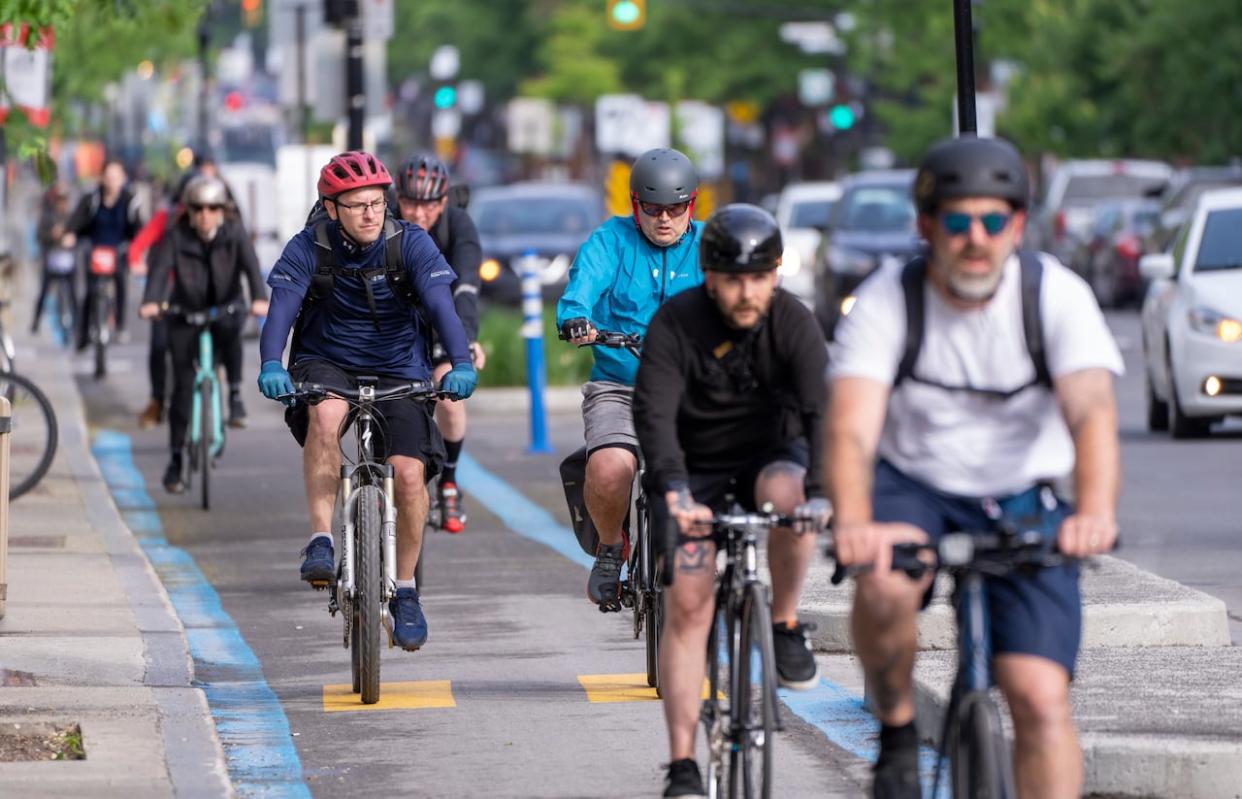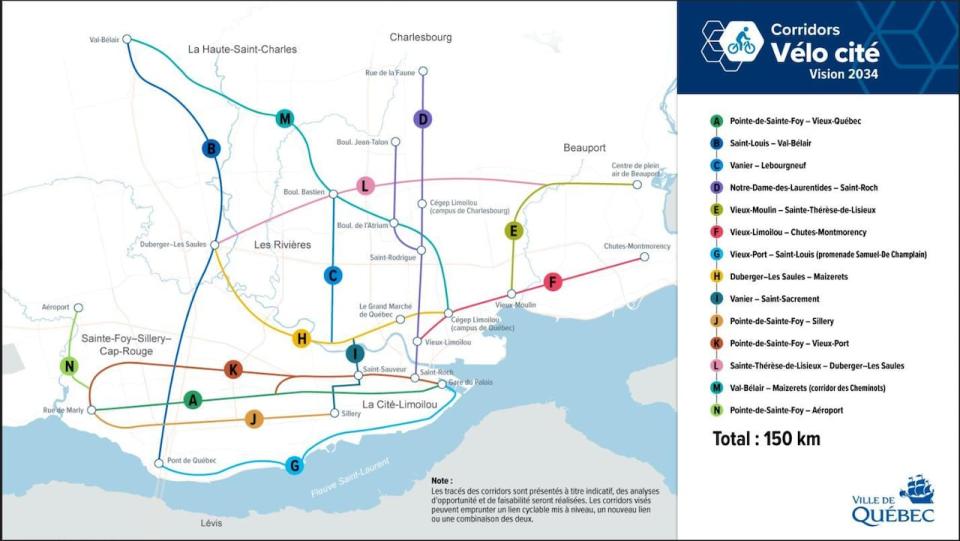Quebec City sets sights on building 150-km cycling corridor by 2034

In 10 years, 85 per cent of Quebec City will be served by a cycling corridor that will connect many of the city's 35 neighbourhoods.
Mayor Bruno Marchand unveiled the city's plan for the 150-kilometre cycling network on Tuesday.
He says the city hopes to achieve 60 per cent of its vision in five years — building 90 kilometres of the corridor with a budget of $29 million and starting with the most feasible paths, working section by section.
With a growing city and more commuters on the road, Marchand says this cycling corridor, also known as corridors Vélo cité (CVC) ,will be good for the economy and the environment.
"If we don't find alternatives to help people commute how they want to, we are done for. That means people driving will spend more time in their car," said Marchand.
"So the drivers who say when we announce a cycling project or active transport project that it's not for them, they're wrong. It is for them."
The city says it wants to ensure 48 per cent of residents are within a 400 metres of a path in the network, which will also connect 77 schools.

The city mapped out the planned cycling paths which will total 150 kilometres and stretch across the city. (Ville de Québec)
'It's really great to see': Vélo Québec
Magali Bebronne, director of programs with the cycling advocacy group Vélo Québec, says this project could encourage people living outside the city centre to turn to cycling.
"Traditionally the utilitarian bike lanes, the ones that really enable people to go places efficiently, were often concentrated in the downtown and in central boroughs," said Bebronne.
"So to have a vision that really allows for all the neighbourhoods to be connected is really a strong point of the plan."
Over the past few years, Bebronne says some municipalities have set up 50-kilometre cycling paths but "didn't offer any kind of security." She says even light infrastructure, such as bollards, can make a difference.
"It's an ambitious plan. It's really great to see," says Bebronne, adding she hopes the plans come to fruition.
"Of course, each time a plan is announced, it's great to see the announcement and then the devil is in the detail. It's about how fast the cities are able to implement it."

Pierre-Luc Lachance and Bruno Marchand presented the city's plan for the 150-kilometre cycling network at a news conference on Tuesday at city hall. (Alexandre Vallée-Roy/Radio-Canada)
Network will be for 'cyclists of all kinds': Mayor
Mayor Marchand says the goal is to offer choice, which will be a "win for all commuters on the road."
"To ensure that people can use this means [of transportation] it takes security and it requires comfort and that's what we're moving toward. The role of our city is not to force citizens or say we will choose for you," said Marchand.
"The role we were given as politicians was to offer choices."
Following the construction of the first 90-kilometre network, the remaining 40 per cent of the cycling network will be made up of more complex projects, requiring heavier work, which will be completed by 2034.
He says right now, many people still take their cars, even if their destination is within five kilometres.
"It's not our citizens fault. We're not throwing blame on them. It's the contrary. We are saying to them we will create a city that will allow them to — should they want to — move around in a comfortable manner," said Marchand.
Councillor and vice-president of the executive committee of Quebec City Pierre-Luc Lachance insists that the cycling network will be for "cyclists of all kinds," not just those "with bikes costing several thousand dollars."
"We're focusing on people who go to the library, children who will be able to go to school [by bike]," said Lachance.
The municipal administration will announce at a later date which sections will be developed in 2024 but confirmed its intention to start with the corridor linking Charlesbourg to downtown, which was announced in December. This path will be constructed gradually, in six sections from 2024 to 2026.
Not 'a war on cars,' mayor insists
The city says the choice of corridors is based on analyses of active mobility needs. Feasibility studies will be carried out for each of the various paths in the network and the city says citizens and local stakeholders will be invited to participate to ensure that the project is carried out in a way that reflects the realities of the local population.
Marchand says this project is not "a war on cars" but he does not have information about how existing roadways or lanes will be affected by the cycling network.
"The goal is not to remove lanes and the goal is also not to say we won't get rid of them," said Marchand. "It's to say we will find the best route to maximize its use."
Following the news conference, Stevens Mélançon of Équipe Priorité Québec said there are still details missing.
"The parking lots, the impact on the streets, the impact on everything [relating to] the environment, the routes," he said. "The intention may be good, but there are a lot of unknowns.".
Jackie Smith, a municipal councillor and the leader of Transition Quebec, says this project will complement the public transport network.
"It was essential to have a long-term vision of a network covering the entire territory, and this has now been achieved," said Smith in a statement.
"There's no doubt in my mind that with this infrastructure, the number of four-season cyclists in Quebec City will grow rapidly, and the whole community will benefit."

